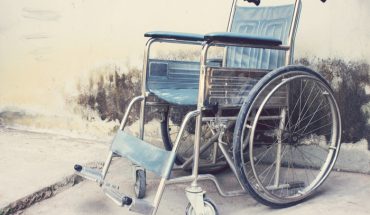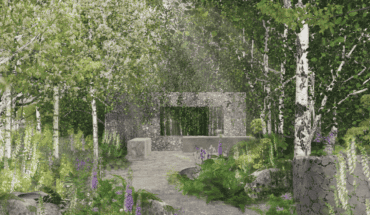I’m happy to be open about the fact that I have incurable lung cancer and I’m also the medical director of Public Health England. I can’t entirely separate the two but this blog is more about my personal take on living and dying and I’m not speaking on behalf of PHE.
I’m 54 years old and I have always been fit and healthy. I’ve never been a smoker and one of my main interests is long distance cycling. But last July, when I was doing a final 600km training ride to prepare for the 1400km London-Edinburgh-London ride, I noticed I was getting a little breathless up the hills. In fact, it got to the point that I had so little energy left that I couldn’t face going up another hill so I retired early and took a train back to my home in Bedfordshire.
In fact, it got to the point that I had so little energy left that I couldn’t face going up another hill so I retired early and took a train back to my home in Bedfordshire.
My wife, who is a doctor herself, picked me up from the station and she suggested I must be unwell because it is so unusual for me to give up on a ride. I admitted that I had been feeling a bit wheezy with a few specks of blood in my sputum during the ride, and thought maybe I had a chest infection. I sought advice from a GP, and had a chest X-ray to check things out and that’s when we discovered that I had a pleural effusion. My lower left lung had collapsed and I had three litres of fluid in my pleural cavity. Further tests found that I had a lung cancer in the left lower lobe, the fluid itself was full of malignant cancer cells and I already had a liver metastatis.
I spent two days in hospital whilst the fluid was drained and I had a pleurodesis to start re-inflating the lung. I felt much better, but my wife and I both knew that it was a life limiting diagnosis. Our four grown-up children took the news very well but we were all in shock really – it came out of nowhere. At first I thought my life expectancy might be a year or so.
In fact, the situation wasn’t quite as hopeless as I feared. My tumour turned out to be treatable with a novel biologic therapy that suppresses tumour growth. After several months of taking the drugs, my tumour has shrunk and the metastatis in the liver is barely visible on the scans.
In fact, the situation wasn’t quite as hopeless as I feared. My tumour turned out to be treatable with a novel biologic therapy that suppresses tumour growth. After several months of taking the drugs, my tumour has shrunk and the metastatis in the liver is barely visible on the scans.
For now, I am back at work and back in the saddle, but I am uncertain how long I’ve got. There is an inevitability that this treatment will stop working at some point, but if we manage to stay one step ahead of the tumour with the treatments that may be available then I will have a few more years if things work out. It’s hard to tell but I am optimistic and the disease is under control.
Faced with death, coming rather sooner than I expected, I have decided to focus on living well for however long I’ve got and not worry about the future. I have four approaches which seem to work for me. Firstly, I am determined to remain physically active. Even with an incurable cancer such as mine, staying fit and active makes a big difference to longer term survival rates. Secondly, I am going to face this thing with a positive mental mind set as it does no good to me or anyone else to be moping around. Thirdly I want things to stay as normal as possible and that including working for me. Fourthly, I want to tone things down a bit and not work all hours and spend more time with people who are important to me.
I thought if I stayed focused on these four principles, it would help me get through, but I have to admit that it is hard not to worry about the future. Specifically, I have worried about how and where I will die. The way that doctors face death is sometimes different, we often accept fewer treatments than others, and of course have seen some of the less dignified ways in which you can die. Of course I know that there are ways to avoid pain, but sometimes, I wish I could have a quiet chat with my GP and ask him to make it easier when the time comes. That is not a conversation you can really have these days. In the past, easing the process of dying with sufficient medication to ease symptoms but which might also hasten your passing was generally accepted but it seems difficult to have this conversation now because there have been so many legal concerns raised.
When it comes to assisted dying, there are obvious important questions to consider for both doctors and patients, especially those with degenerative neurological conditions. This mustn’t distract us from the wider point, however, that we all need to face the reality of our own mortality much sooner than we currently do. Accepting this does not take away from striving for better curative treatments, but it accepts that they won’t work for everyone all of the time. For that reason, I have already spoken to my doctor and advised him that I don’t want to be resuscitated using CPR if my heart stops. I don’t want someone jumping up and down on my chest for my last moments. But, I have realised that, in practice, this is almost impossible to guarantee because my wishes as a dying person can easily be unknown or not understood when people are dealing with someone who has collapsed, unless you are obviously in the terminal phase of your illness at the time.
I also know I don’t want to spend my last hours in hospital. I’ve spent two nights in hospital getting my chest drained, and it’s not a place where I want to die. I want to die in a peaceful place without the hubbub of nurses and visitors and machines beeping and alarms going off.
There’s also the sense of loss to contend with. I planned to live until I was in my 80s, cycling marathon bike rides and spending time with my wife and children, and all that disappears.
There is an upside too. I have found it is empowering when you face death head on. It means you focus your attention on the really important things and it makes me appreciate this life more than ever. When people complain about growing old, as I used to as well, I reply that growing old is a privilege and one that I wish now I could have.
Professor Paul Cosford was one of the speakers at the recent RSM seminar, Choice at the End of Life.
- And Life Goes On - 18th November 2019
- Paul Cosford – I still hope for a cure for my cancer - 3rd March 2019
- Paul Cosford: Meeting my palliative care team - 24th July 2018








Dear Paul, sorry to learn of the cancer you are afflicted with. However, you seem to be recovering well even though you state that the cancer is incurable. I suggest the following 1 Keep an aloevera and other such plants in your bedroom as that releases oxygen at night. 2 Always be optimistic, hoping against hope all the time. It is not always in the hands of a person to refuge entry to an incoming disease. Therefore, we must always keep ourselves optimistic. Sadness shall only enhance the problem besides making our well-wishers and relatives all the more sad as… Read more »